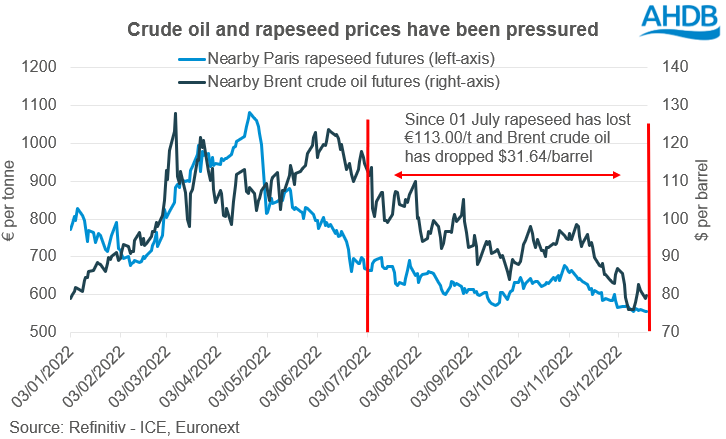Reduced demand pressuring crude oil: Grain market daily
Wednesday, 21 December 2022
Market commentary
- UK feed wheat futures (May-23) closed yesterday at £238.90/t, down £0.10/t on Monday’s close. New crop futures (Nov-23) lost £0.60/t over the same period, closing at £227.40/t yesterday.
- Grain exports out of the Black Sea continue to pressure prices and rains in Argentina slightly eased soil moisture concerns following ongoing drought conditions for soyabeans and maize plantings.
- Paris rapeseed futures (May-23) closed at €562.50/t yesterday, down €0.50/t on Monday’s close.
- On Monday the European commission’s MARS report for crop monitoring in Europe was released, indicating winter crops are generally faring well. Despite the drop in temperatures in the first half of December, frost damage is low and concentrated in central and eastern Germany and Poland. Low temperatures have also improved crop hardening. Warmer-than-usual temperatures enabled late sowing of winter crops in the Black Sea region.
Reduced demand pressuring crude oil
This year crude oil prices have been historically high following the war in Ukraine. Nearby Brent crude oil futures were $127.98/barrel as at 08 March, the highest close since 2008. This was one factor that has been supporting the oilseed complex along with reduced Black Sea vegetable oil supplies. From this Paris rapeseed futures (nearby) hit €1,081.25/t on 22 April.
However, in recent weeks crude oil prices have been falling from these highs in March and current prices are trading at $80.82/barrel (as at 11:00), which has been weighing on rapeseed prices as well to some extent.
What has been impacting crude oil?
Recently much of crude oil’s pressure has been from weakening demand from China due to COVID-19 lockdowns. Also the UK, EU and US central banks have been raising interest rates to tackle inflation, increasing fears of recession.
Further adding to this pressure is the fact that at the start of December OPEC+ agreed not to reduce crude oil output despite concerns over global demand. Also, in recent weeks G7 countries and Australia have imposed a $60/barrel price cap on Russian oil. Further to this, the EU have banned imports of Russian oil as the embargo agreed in June has now come into effect.
What could happen to crude oil?
Going into 2023 there are some estimates that average annual crude oil prices could drop from the highs we have seen this year. This is from the potential for weaker annual demand growth in comparison to 2022, and ample supplies from OPEC+ and Russia. However, it is worth noting that in February 2023 there will be the next review of OPEC+ outputs which could change market sentiment if cut drastically.
Moreover, there are many uncertainties surrounding crude oil markets, and much of the forecasts for demand growth are assuming A) successful containment of COVID-19 in China, with resumption of pre-pandemic growth. B) Resolution of the war in Ukraine. Both of these events are very hard to predict.
Further to all this, what potentially bears on the market is globally reduced demand going into Q1 2023 from the potential recession.
Crude oil is just one of many factors that will drive ex-farm rapeseed prices but has been one of the contributors to rapeseed price pressure in recent weeks. Going into 2023, there are many global affairs that could drive crude oil prices, which could filter into rapeseed prices.
Sign up for regular updates
You can subscribe to receive Grain Market Daily straight to your inbox. Simply fill in your contact details on our online form and select the information you wish to receive.
While AHDB seeks to ensure that the information contained on this webpage is accurate at the time of publication, no warranty is given in respect of the information and data provided. You are responsible for how you use the information. To the maximum extent permitted by law, AHDB accepts no liability for loss, damage or injury howsoever caused or suffered (including that caused by negligence) directly or indirectly in relation to the information or data provided in this publication.
All intellectual property rights in the information and data on this webpage belong to or are licensed by AHDB. You are authorised to use such information for your internal business purposes only and you must not provide this information to any other third parties, including further publication of the information, or for commercial gain in any way whatsoever without the prior written permission of AHDB for each third party disclosure, publication or commercial arrangement. For more information, please see our Terms of Use and Privacy Notice or contact the Director of Corporate Affairs at info@ahdb.org.uk © Agriculture and Horticulture Development Board. All rights reserved.


